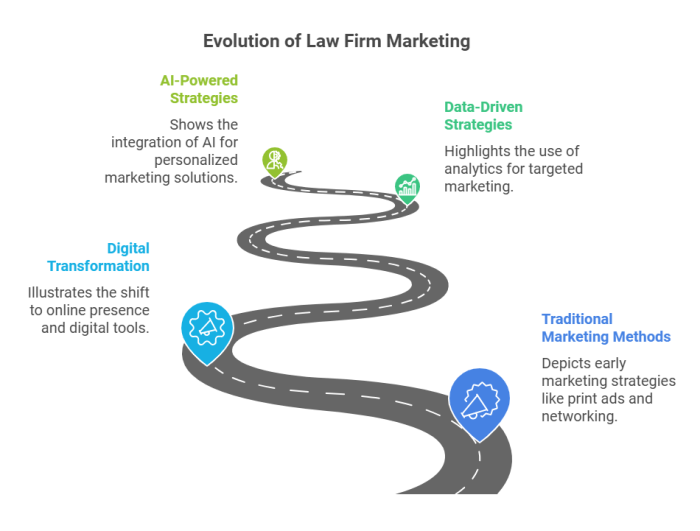Law Firm Internet Marketing Strategies That Work: A Comprehensive Guide
Diving into the world of Law Firm Internet Marketing Strategies That Work, this guide aims to provide valuable insights and practical tips for law firms looking to enhance their online presence and attract more clients. From identifying key components to discussing personalized content and , this topic covers it all.
As we explore successful examples and delve into the importance of website design, user experience, content marketing, and social media strategies, readers will gain a deeper understanding of how to effectively market a law firm in the digital age.
Law Firm Internet Marketing Strategies That Work
Law firms looking to succeed in the digital landscape need effective internet marketing strategies to reach their target audience and stand out from the competition. Let's explore the key components of successful internet marketing strategies for law firms.
Identifying Target Audience
Before implementing any marketing strategy, it is crucial for law firms to identify their target audience. Understanding the demographics, interests, and behavior of potential clients can help tailor marketing efforts for better engagement and conversion.
Creating High-Quality Content
One of the most effective ways for law firms to attract and retain clients online is by creating high-quality, relevant, and personalized content. From blog posts to informative articles and case studies, content that addresses the needs and concerns of potential clients can establish credibility and trust.
Utilizing Social Media
Social media platforms offer law firms a powerful tool to connect with their audience, share valuable content, engage in conversations, and build a strong online presence. By utilizing platforms like LinkedIn, Twitter, and Facebook, law firms can increase brand visibility and reach a wider audience.
Implementing Strategies
Search Engine Optimization () plays a crucial role in driving organic traffic to a law firm's website. By optimizing website content, using relevant s, and improving site structure, law firms can improve their search engine rankings and attract more potential clients.
Website Design and User Experience
Website design plays a crucial role in the effectiveness of internet marketing for law firms. A well-designed website can attract visitors, establish credibility, and convert leads into clients. Here are some tips for creating a user-friendly website that can help drive conversions:
Creating a User-Friendly Website
- Keep the design clean and professional to instill trust in visitors.
- Ensure easy navigation with clear menus and intuitive layout.
- Include clear calls-to-action to guide visitors on the next steps to take.
- Optimize loading speed for a seamless user experience.
- Utilize high-quality visuals and engaging content to capture attention.
Importance of Mobile Responsiveness
A mobile-responsive website is essential in today's digital landscape, as more users access the internet through smartphones and tablets. Ensuring that your law firm's website is optimized for mobile devices can improve user experience, boost search engine rankings, and increase conversions.
Website Platforms for Law Firm Marketing
There are various website platforms available, each with its own strengths and weaknesses. When choosing a platform for your law firm's website, consider factors like customization options, ease of use, capabilities, and mobile responsiveness. Popular platforms like WordPress, Squarespace, and Wix offer templates and features that cater to the needs of law firms looking to enhance their online presence.
Content Marketing for Law Firms

Content marketing plays a crucial role in establishing a law firm as an authority in its field, helping to build trust and credibility with potential clients. By consistently creating and sharing valuable, informative content, law firms can showcase their expertise and knowledge, positioning themselves as go-to resources for legal information and services.
Types of Content that Resonate with Potential Clients
- Informative Articles: Providing relevant and timely information on legal topics of interest to potential clients can help showcase the firm's expertise and build credibility.
- Case Studies: Sharing success stories and examples of past client outcomes can help demonstrate the firm's track record and capabilities.
- FAQs and Guides: Addressing common questions and concerns in a clear and accessible manner can help potential clients understand complex legal issues and feel more confident in seeking the firm's assistance.
- Legal Updates and News: Keeping clients informed about changes in laws and regulations that may affect them can position the firm as a trusted source of up-to-date information.
Role of Blogging and Articles in Driving Organic Traffic
Blogging and articles are powerful tools for driving organic traffic to a law firm's website. By regularly publishing high-quality, relevant content that addresses the needs and interests of the firm's target audience, law firms can improve their search engine rankings and attract more visitors to their site.
This can result in increased visibility, brand awareness, and ultimately, more potential clients.
Tips for Creating Compelling Content
- Understand Your Audience: Tailor your content to address the specific needs, concerns, and interests of your target audience.
- Be Clear and Concise: Use plain language and avoid legal jargon to ensure your content is accessible and easy to understand.
- Provide Actionable Advice: Offer practical tips and guidance that readers can apply to their own situations.
- Use Visuals: Incorporate images, infographics, and videos to enhance the appeal and engagement of your content.
- Stay Consistent: Maintain a regular posting schedule to keep your audience engaged and coming back for more.
Social Media Marketing Strategies
![How to Grow Your Law Firm Using Digital Marketing [VIDEO] How to Grow Your Law Firm Using Digital Marketing [VIDEO]](https://platform.radarcirebon.tv/wp-content/uploads/2025/08/law-firm-marketing-strategy-1024x405-1.png)
Social media has become a powerful tool for law firms to connect with their audience, showcase expertise, and build brand awareness. Here are some key benefits of using social media platforms for marketing a law firm:
Engagement and Brand Building
- Law firms can engage with potential clients on social media platforms, answering questions and providing valuable insights.
- Showcasing thought leadership and expertise can help build credibility and trust with the audience.
- Regularly posting updates and sharing relevant content can increase brand awareness and visibility.
Successful Social Media Campaigns
- A law firm may run a campaign highlighting a recent successful case to showcase their expertise and results.
- Launching a social media contest or giveaway can help increase engagement and attract new followers.
- Collaborating with influencers or industry experts can amplify the reach of the firm's social media content.
Effective Account Management
- Plan a content calendar to ensure consistent posting and engagement on social media platforms.
- Monitor and respond to comments and messages promptly to maintain a positive interaction with followers.
- Adhere to legal ethics regulations when sharing content on social media, avoiding any misleading or inappropriate information.
Closure

In conclusion, mastering internet marketing strategies is crucial for law firms seeking to stand out in a competitive landscape. By implementing the right tactics and staying abreast of the latest trends, law firms can effectively reach their target audience and achieve their business goals.
Detailed FAQs
How important is personalized content in law firm marketing?
Personalized content is crucial in law firm marketing as it helps build trust and credibility with potential clients, showcasing the firm's expertise and understanding of their unique needs.
What role does blogging play in driving organic traffic to a law firm's website?
Blogging is essential for generating organic traffic as it allows law firms to regularly publish relevant and valuable content that can attract visitors, establish authority, and improve search engine rankings.



